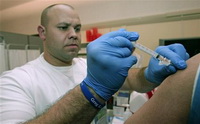H1N1: Effectiveness of Vaccines Depends on Age Group
A single 15-microgram dose of the N1N1 vaccine works well for 92 percent of pregnant women, but young children will still need two doses for best results, federal health officials said Monday.

Twenty-one days after receiving a single dose of the vaccine, almost all pregnant women showed a robust immune response, Dr. Anthony Fauci reported.
A larger, 30-microgram dose produced a strong response in 96 percent of pregnant women, said Fauci, director of the National Institute of Allergy and Infectious Disease.
"This should be reassuring news to those women who have received the vaccine," Fauci said.
While a single dose is recommended for healthy adults and pregnant women, officials have said younger children will need two doses.
That has been confirmed by continuing studies, Fauci said, The Associated Press reports.
Meanwhile, an independent group of experts appointed to help government officials monitor the swine flu vaccine's safety starts work today. Among its first tasks is to consider study data on the vaccine's effects in more than 10,000 people, according to the AP. So far, efforts to assess safety have turned up nothing unusual, Bruce Gellin, head of the National Vaccine Program Office, tells the AP, but it's important to be on the lookout for possible rare side effects. Additional scrutiny of the H1N1 vaccine comes after the last vaccine to fight an outbreak of swine flu in 1976 was linked to Guillain-Barré syndrome, a rare disorder that results in paralysis, U.S. News & World Report reports.
It was also reported, health experts say that people 65 and older are least likely to contract swine flu, and therefore they are not on the priority list for vaccination. However, if elderly people do get sick, they have a high risk of developing serious complications from H1N1.
Blood samples taken from older people indicate that they possibly have pre-existing immunity to the H1N1 virus, according to the U.S. Centers for Disease Control and Prevention. Health officials suggest that elderly people get their seasonal flu vaccine first and get in line behind high-risk groups for the H1N1 vaccine. However, health officials advise that elderly people see a doctor immediately if they develop flulike symptoms.
The effectiveness of vaccines varies depending on the age group and underlying medical conditions, health experts said. In general, seasonal flu vaccines are 70 to 90 percent effective, according to Dr. David Tayloe, president of the American Academy of Pediatrics.
However, it is too early to determine the effectiveness of the H1N1 vaccine. "We have not had the vaccine long enough to know how many of those immunized will develop immunity or how long they will be immune," said Tayloe, Chicago Tribune reports.
Subscribe to Pravda.Ru Telegram channel, Facebook, RSS!


